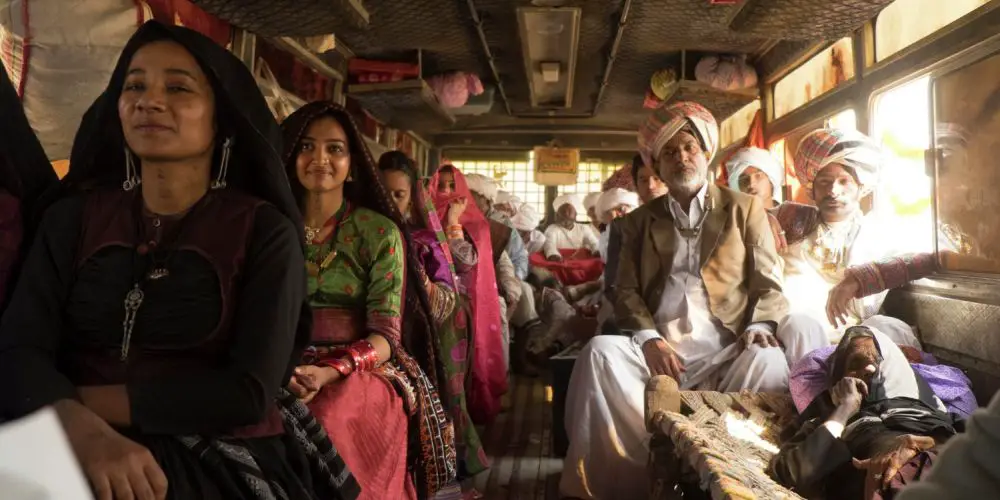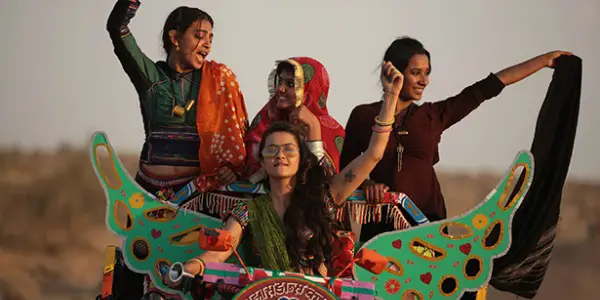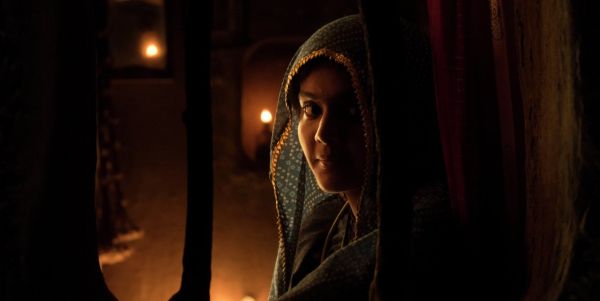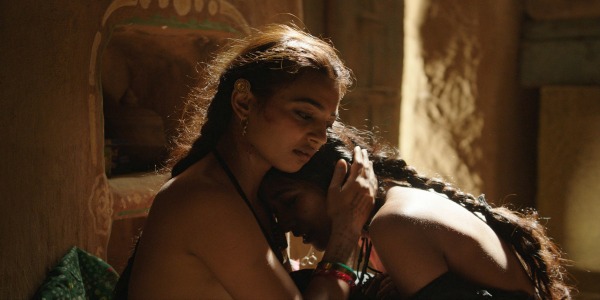PARCHED: A Story Of Freedom And Friendship

Becky spends her days working in TV and she spends…
In the beautiful desert landscape of Gujarat, India, director Leena Yadav introduces us to a world of friendship, suffering and heartbreak within a story of four women, trying their best to overcome their individual struggles.
Parched explores the ideas of tradition, culture and misogyny in the heart of rural India but with a compelling characters and strong friendships that feel universal to us all.
Tradition & Culture
The story centers around four women: Rani (Tanisha Chatterjee), Lajjo (Radhika Apte), Janaki (Sayani Gupta) and Bijli (Surveen Chawla). The women’s lives are interlinked through various connections, and the story begins with Rani, travelling to a nearby village to meet Janaki, the girl she hopes will marry her son Gulab.
Despite Rani’s own experiences of arranged marriage, she believes it to be the best thing for her son, and Janaki is bought back to the village. Rani wrestles her own demons as her son becomes more and more aggressive towards both herself and Janaki. Rani’s best friend in the village, Lajjo, is struggling with her own infertility and the abuse from her husband that results of her inability to bear a child.

Bijli, a longtime friend of Rani, is an exotic dancer who frequently visits the village whilst on tour. Bilji wants to become financially independent, but realises that it is impossible for her, as her career and well-being are in the hands of her manager/pimp.
Rani, widowed and hopeful for a good future for her son, begins to unravel as Janaki is not all that either herself or her son hoped for. It is revealed that Janaki’’s hair has been cut off (due to lice), the night before the wedding. In keeping with Indian culture, a woman’s hair is her beauty – and Rani is distraught Janaki’s appearance.
As she expects, her son is also furious – especially with Rani for bringing her Janaki. At one point he demands that Rani ‘refund’ Janaki – reiterating the idea that women are only of transactional value and worth nothing more. Gulab is made even more frustrated by the situation when his friends make fun of his bride, inciting him to be even more aggressive with both Janaki and Rani.
A Light in the Dark
The world that Yadav has created is immersive, and Chatterjee is phenomenal as Rani. Her day-to-day struggles, whilst not completely universal, encompass the role of the mother, the friend and the working woman – all things that Rani is expected to be. She has to be the primary earner, but also subservient to the men in the village and to her own son.
In contrast, Bijli seems to have a much different life to the other women and appears to come and go as she pleases – not adhering to any of the labels which women are expected to be. When we first meet her she is dancing for a crowd of men, the music and cinematic style are reminiscent of a Bollywood film.
Happier and carefree, Balji seems to have a life that both Lajji and Rani envy. This is undermined later on, however, when one of the male dancers wants to run away with her. He explains that he can become her manager and make sure no harm comes to her. Though his intentions sound honest, Bijli recognises this as just another man who wants to control her, like her pimp.

The climax of the film comes when Bijli borrows a brightly coloured, glow light adorned rickshaw style bike and the four women ride off into the dusty desert. Though their adventure is relatively short-lived, their moment of absolute freedom is glorious. Set against the dull yellows of the sand, their bike stands out in bright neon colours. I couldn’t help but think of Thelma and Louise; Rani and the others gain their momentary freedom via the use of a vehicle.
The physical and emotional escape combine – they are literally running to their freedom. Far from being trapped in their homes, their kitchens or bedrooms, they have the means to travel where they want to go. There is a tremendous sense of hope – the camera emasculates the women as they wander through ruins, dancing around each other.
In one incredibly poignant scene, Lajji and Rani sit on the floor in Rani’s kitchen, Lajji nursing the fresh bruises her husband has given her. Rani tenderly cares for Lajji and the two women slowly embrace each other. There is a connection of trust, need and a desire to be loved – none of which the two women are able to get from anywhere else in their lives.
Utterly desperate, but in support of each other, there is an unspoken love and even desire for each other. Shot beautifully and sensitively, Yadav treats both characters with respect and allows the audience to understand the deep rooted relationship between them.
The cinematography is breathtaking, and the extreme wide shots that director of photography Russell Carpenter uses emphasize how small the four women are against the backdrop of rural India. As they drive off on the bike, which is arguably the most cinematic scene, we are reminded of another film where women drive into the unknown to escape patriarchal forces: Mad Max: Fury Road.
Parched is a very different film to Fury Road, but the vehicle as a symbol of escape from a hegemonic society is one that stands strong in both films.
Oppression and Freedom
Rani’s life in the village, as we have seen, is entrenched in chauvinism and sexism. There are almost no male characters who have good traits or characteristics within Parched. It’s not that there are no ‘good men’, but this truly is a story about women who have been so ultimately wronged by men and society.
We see this in the words that Rani and Bijli say to each other when the two of them fight. Rani calls Bijli a whore, a word drenched in masculine anger towards sexually active women. Bijli condemns Rani for raising a son who visits prostitutes, but the blame in this situation is laid on both Rani and prostitutes – not on Rani’s son who is the only active participant.
Instead of blaming their own society and the men that instigate these rules and ‘traditions’, the women fall prey to blaming each other; just as a patriarchal society encourages.

Yadav thoroughly succeeds in presenting Lajji, Rani, Bajli and Janaki as more than just caricatures or stereotypes that we used to seeing in contemporary media. This is especially true non-Western women – there is tendency to believe that they need saving.
In Parched, Yadav makes it abundantly clear that these are intelligent, sensual, complicated women who are capable of saving themselves, no matter what anyone else may think. Yadav based Parched on countless stories that she had heard from various women, and she handles their narratives with the utmost sensitivity.
Though history seems doomed to repeat itself (the younger men in the village behaving in line with the older men and Gulab’s treatment of the women in his life), there is a small glimmer of hope and the end of a film which doesn’t have very many good things to say about humanity at large.
Following the trauma, abuse and neglect of each of the women, Parched ends on an oddly optimistic note. It may be unrealistic of Yadav to allow her heroines an ending of potential happiness, when we know that it is unlikely to work out for them. However, a glimmer of hope in this desperate landscape is badly needed and the final scene is indefinite enough for us to imagine what Rani, Balji and Lajji will do next.
An Important Message
In a melting pot of masculine anger and blatant misogyny, there is feminised love, lust and strength. Visually stunning and tackling stories that are painfully difficult to tell, Parched should be at the top of your watch list.
Have you seen Parched? What do you make of it’s message about patriarchy and oppression?
PARCHED opens in the U.S. via Wolfe Video on August 9th on DVD and VOD, across all digital platforms including iTunes, Vimeo On Demand and WolfeOnDemand.com.
https://www.youtube.com/watch?v=pcVwe7W1brY
Does content like this matter to you?
Become a Member and support film journalism. Unlock access to all of Film Inquiry`s great articles. Join a community of like-minded readers who are passionate about cinema - get access to our private members Network, give back to independent filmmakers, and more.
Becky spends her days working in TV and she spends every other minute writing about cinema, TV & feminism. Based in London, she also likes drinking gin, re-watching 'The X Files' and writing about on-screen representation and all manner of things over at femphile.com












